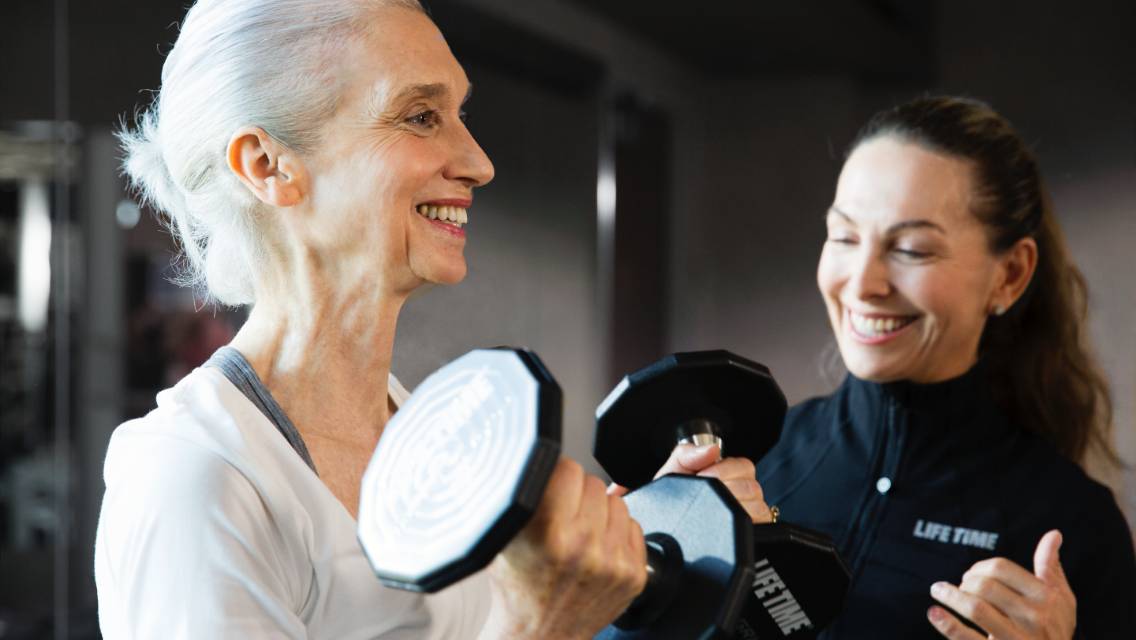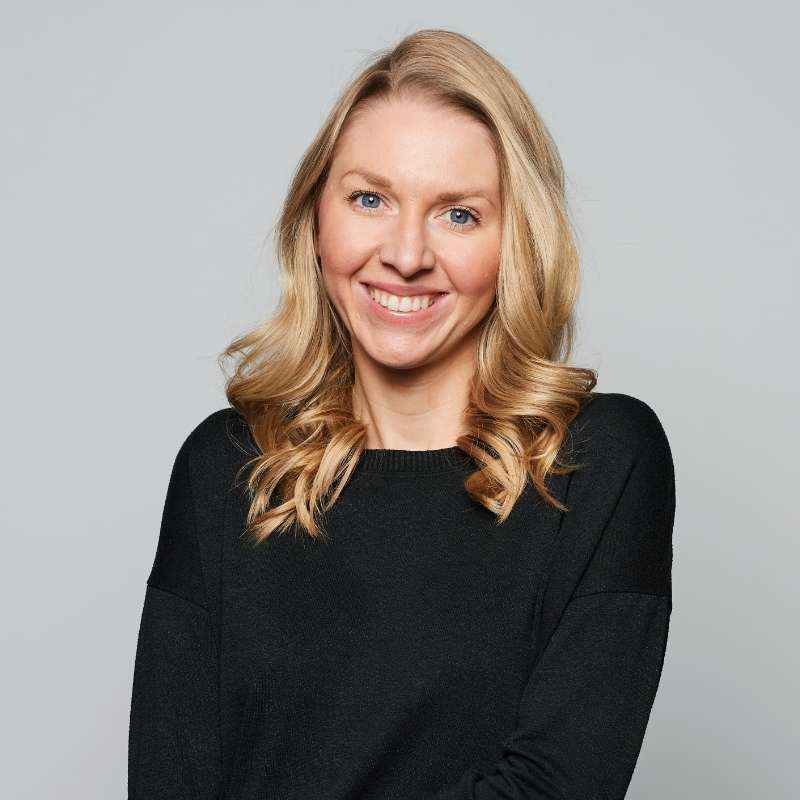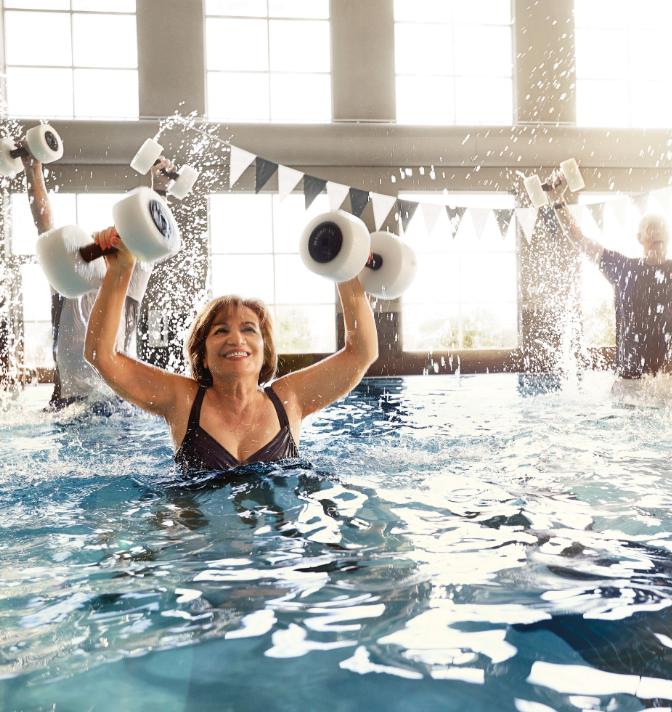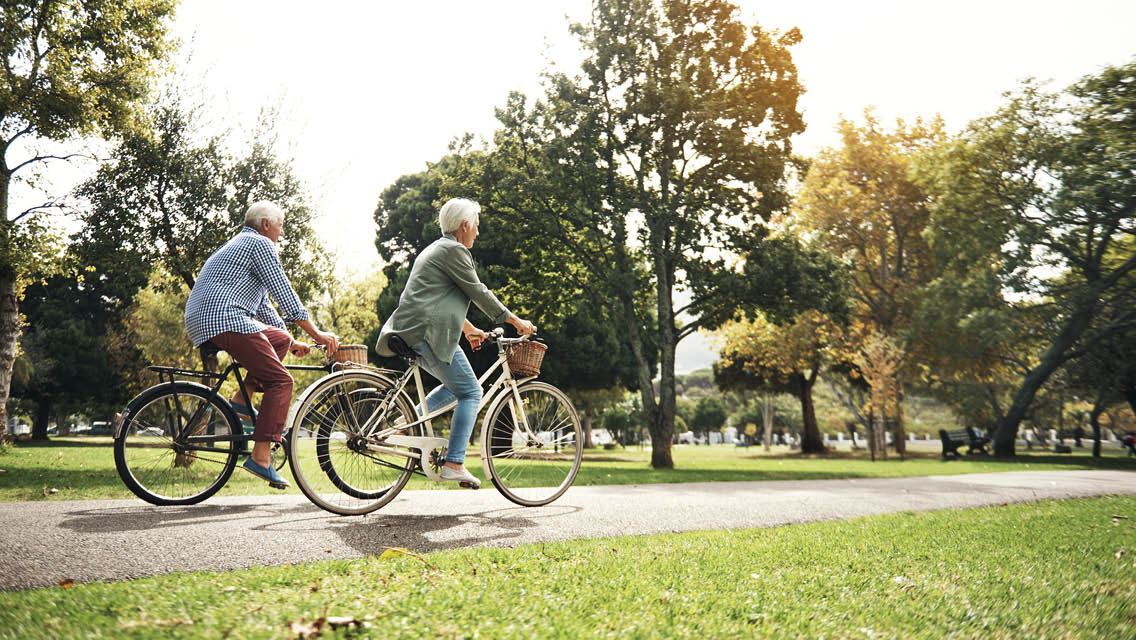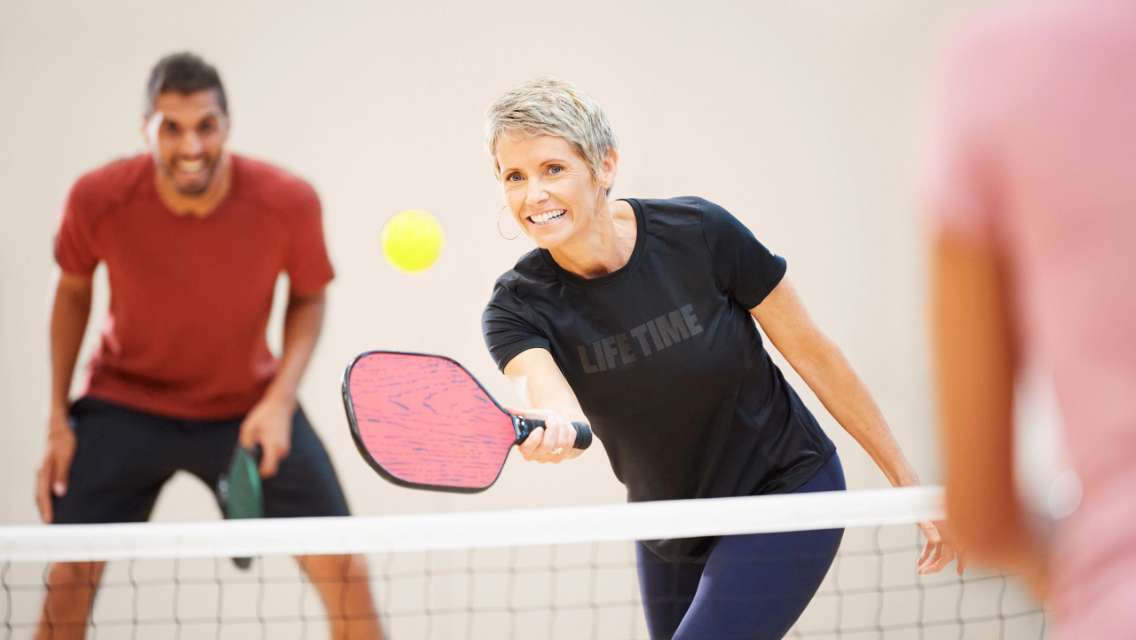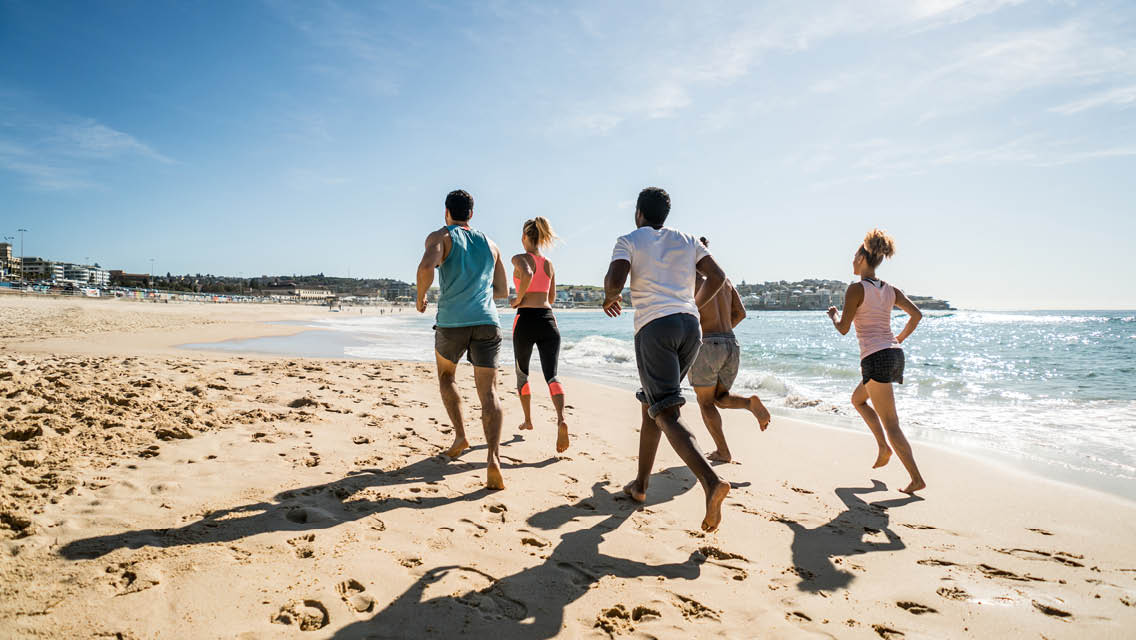The past two years have taken a toll on our collective health, with those of a more mature age experiencing some of the biggest health concerns and challenges as a result of COVID-19. Yet pandemic or not, there is often a belief (and acceptance) that we are inevitably bound to experience more aches and pains, more limited mobility, more doctor’s visits, and more disease diagnoses as we age.
Research shows, however, that lifestyle factors — such as moving and nourishing our bodies, staying connected to others, and participating in activities to keep our minds sharp — can have a tremendous impact on our quality of life year after year.
ARORA is Life Time’s effort to make those transformative factors more widely and conveniently available to our members. We spoke with Renee Main, senior vice president of healthy aging, to learn more about it.
Life Time Editorial | At a high level, how would you explain what ARORA is?
Renee Main | ARORA is a community for mature adults. It includes a collection of physical, social, and educational activities to help you improve your strength, mobility, and nutrition, as well as provide opportunities for social interaction.
This portfolio of offerings is comprehensive, variety filled, and designed and led by our team of experts. An additional benefit for members is that it’s all available in one location at their home club.
You’ll see offerings start in your club on January 10, 2022, with additional classes, trainings, workshops, events, and more to be added throughout the year. You will also be able to access some features, such as livestream classes, in the Life Time Digital app.
LTE | Why is Life Time launching ARORA?
RM | Our mission at Life Time is to help people at every life stage, from 90 days to 90-plus years. We designed ARORA so that we could help an entire generation — one that has more physical issues, is on more medications, and is lonelier than ever — live a healthier life so they can keep doing what they love for years to come.
LTE | What offerings are included in ARORA?
RM | All programs, services, and activities for ARORA will fall into one of three different buckets:
- Movement classes, workouts, and sports. We’ll offer a variety of ways to increase physical activity, including the following:
- ARORA classes — aqua, cardio, strength, and total-body classes — that are specifically designed for those ages 55 and older.
- Additional fitness classes curated from the Life Time portfolio that are low impact and easily modifiable, such as ROOT yoga, Strictly Strength, and Pilates.
- Low-impact workout plans designed by certified personal trainers that can be completed on the workout floor.
- Pickleball, tennis, and other options for playing sports.
- Social activities. To start, this will include a coffee club that takes place twice a week. More options like game clubs and mixers are coming soon.
- Educational workshops. Taught by our experts, these sessions will focus on different healthy-living topics, including overviews on how to use exercise equipment, the health benefits of certain fitness activities, and what and how to eat to be healthy as your body changes.
LTE | Can you speak to some of the benefits that ARORA will offer to members?
RM | Through ARORA offerings, we will be able to help support members in the following ways:
- Reduced loneliness. One in four adults ages 65 and older are considered to be socially isolated and report being lonelier than they were prior to the pandemic. We’ll facilitate a community and opportunities to interact with new friends.
- Improved strength, bone density, and mobility, and decreased back and hip issues. The functions of everyday life can become more difficult as we age — and increased sedentariness can result not only in decreased strength, but also more aches and pains. Our programming will focus on exercise efforts to support aging bodies.
- Lowered likelihood of developing a chronic disease, or reduced impacts of disease if one already exists. Diabetes, cardiovascular disease, COPD, asthma, cancer, and arthritis are all highly prevalent in adults ages 55 and older. These diseases can often be prevented — and certainly can be managed — with healthy diet, exercise, and lifestyle choices.
- Increased independence and quality of life. Improvements in fitness, mobility, eating habits, and disease management can have a dramatic impact on how you feel and function every day.
- Financial savings. Life Time offers a discounted membership for those ages 65 and older, while many club locations also accept benefits from Medicare plans. You can click here to see what Medicare benefits are offered at your club.
LTE | As you look toward future programming and plans for ARORA, what are some things you’re most excited about?
RM | I’m looking forward to the fitness-class types we’ll continue to add, such as formats like chair yoga and walking club. We’re planning to add a comprehensive movement assessment and corresponding tailored plan for individuals.
We’ll also expand our social offerings, so members feel comfortable spending time at Life Time, whether they’re looking to meet new people or hang out with their other Life Time friends.
I’m also really excited about a policy change we’re working on that will let grandparents add their grandchildren on their membership. I watch my 1-year-old grandson on occasion and would personally love to be able to bring him swimming in the pool and then drop him off at the Kids Academy for an hour while I take a class.
LTE | What would you say to those who might think it’s too late to make efforts toward a healthy way of life, or that Life Time isn’t the right place for them?
RM | In talking to experts both internally and externally on healthy aging, one thing is clear: Adding physical activity at this phase of life can drive significant improvement to your life’s quality.
I was recently speaking to a member in a club who lives nearby in a senior community. She had been an active Life Time member prior to COVID. During COVID, when she was isolated to her senior community, she gained weight, lost mobility, and had to go on several medications she hadn’t previously needed.
Last spring, she came back to Life Time, and started working with a personal trainer twice a week. She is down 15 pounds, proudly rattled off all her bloodwork improvements, and is very close to being able to go off those medications. This is a testament to what a little regular physical activity and nutrition guidance can do.
There are many people who don’t come to Life Time because they have the perception that it’s for “young, fit people” and they don’t feel like they’d belong. When you come into Life Time though, you see our members are people of all ages, shapes, and sizes. Every Life Time member has one thing in common: They want to live a healthier, happier life. Life Time can help anyone do that — from 90 days to 90-plus years.
LTE | Why is ARORA something you’re personally so passionate about and connected to?
RM | Helping a generation find a community to be healthier is very personal to me. I’m in my 50s with a new grandson. I want to easily get down on the floor to play with him. I want to take him on a backpacking trip into the mountains when he’s in his teens. I want to dance at his wedding. I know I won’t be able to do those things if I don’t take care of my body — and the reality is, my body simply doesn’t work the same as it used to.
I’m also watching my parents and my husband’s parents age in very different ways. It’s clear to me how being socially and physically active dramatically affects their quality of life.
For example, my father meets friends for coffee club daily, bikes for miles, walks on a treadmill, and takes time in the sauna. He can do nearly all the things he’s always loved to do, such as golf, travel, put his boat in and out of the water, and go fishing.
My mother, on the other hand, has been very sedentary and now can’t do most of the things she used to love, like travel, shop, or visit friends and family. She relies on a walker to go everywhere out of fear of falling. Although her mind is sharp, the physical limitations make her feel more isolated.
I told my mom about some of the ARORA classes at Life Time and she is going to take an aqua class with me. This is a huge win for me and I know it will be for her, too, as she regains some of the strength she’s lost. Maybe she will then be able to get back to the annual trips she used to take with her three daughters.
I want to ensure we live up to our brand promise of helping people live a healthy way of life for their entire lifetime — for me, for my parents, and for the millions of others out there who want to keep doing what they love for years to come.
LTE | If someone is interested in ARORA, how can they get engaged?
RM | If you’re a Life Time member, you can visit the ARORA page to learn more and view the schedules for this new collection of offerings. You can also talk with the Member Concierge team at your club.
If you’re not a Life Time member, you can click here to learn more about ARORA and membership options.
